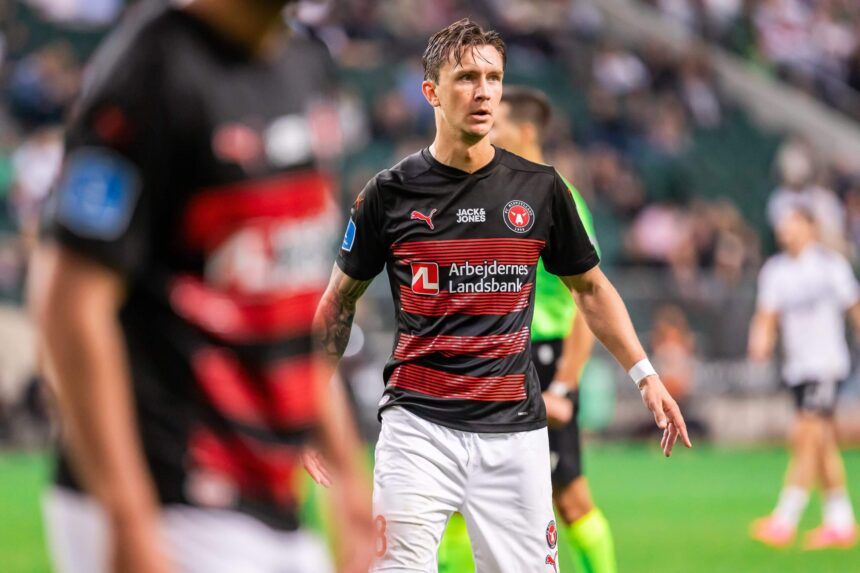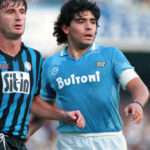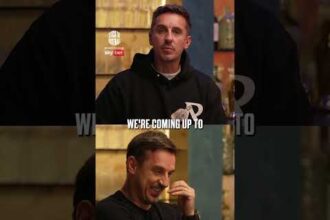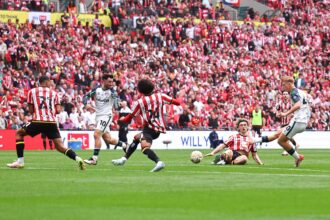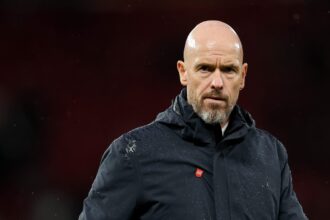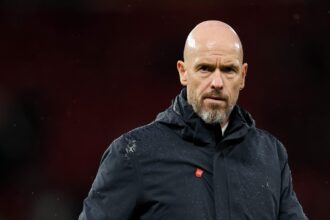“With a strong wolf mentality, you won our hearts. A true warrior from Central Jutland. All the best in the future. Thank you for everything, Kris. The superman of Midtjylland.”
Danish champions Midtjylland paid an emotional farewell on Saturday to Sweden midfielder Kristoffer Olsson, who was in the squad that won the club’s first Superliga trophy in 2015 and, against all odds, carried their fourth onto the pitch on the final day of last season.
Advertisement
That the 29-year-old was present, let alone capable of leading the celebrations, was nothing short of miraculous.
On February 20 last year, Olsson was found unconscious in his home in Herning, Denmark, while his parents and four-year-old son, Jamie, were visiting from Norrkoping, Sweden. He was taken to Aarhus University Hospital, where he was placed on a ventilator and subsequently diagnosed with an acute brain illness.
An extremely rare inflammatory condition in his blood vessels caused several blood clots to form on both sides of his head, placing him in a coma and robbing him of the ability to speak, walk and eat.
His family and two of Midtjylland’s executives were gathered around his bed for the first week as they watched Olsson battle for his life.
He survived and has defied all expectations and timelines since.
After seven weeks, he regained his motor function and verbal abilities. After 13 weeks, he hauled the cartoonishly large league trophy to the podium. After six months, he was released home and, after seven months, he was back training.
Thirteen months on from that traumatic day, he has chosen to exit his contract and return to Allsvenskan club IFK Norrkoping, whose academy he played for from 11 until Arsene Wenger signed him for Arsenal as a 16-year-old, in pursuit of a return to competitive football.
It is the same determination and fortitude that sees Olsson alive today and able to recount, what he can, of an illness that threatened his life and left a two-month black hole.
Here, he tells The Athletic his story.
Olsson playing for Midtjylland in August 2023 (Mikolaj Barbanell/SOPA Images/LightRocket via Getty Images)
“I don’t remember anything (of that day),” Olsson says from the kitchen counter of the house at which he fell ill.
“The first thing I remember after (the illness struck) is in April.”
Olsson relies on pictures from his phone to get a sense of the days and weeks that preceded his sickness.
In February 2024, Denmark’s Superliga season was resuming after its winter break, so Olsson used a few days’ rest to visit his son, who lives with his ex-partner in Norrkoping, the city where he grew up. His son was sick but so, too, was Olsson and he realises retrospectively that he looked ill in the pictures of them together.
Advertisement
He returned to training the next week but he had to pull out of a session during the warm-up and missed the 1-0 defeat against Brondby on February 18. His parents, Lena and Mats, arrived from Norrkoping with his son the night he fell ill.
“My parents have told me I was tired and said I had to sleep,” he says. “I went to bed but after one or two hours, I got up and was sleeping on the sofa. They said maybe it was better to sleep in the bed so I went. Jamie was sleeping with them but they woke up and came in my room around 5am.
“They saw I had vomited everywhere in the room and all over myself. They hadn’t heard anything. They were like, ‘Hello Kris, hello’ (slapping his face). My heart was beating but I was just lying there with my eyes closed.”
An ambulance arrived and took Olsson to the hospital in Aarhus, around 50 miles east of Herning, with his father in tow, while his mum protected his son from reality by saying his father had a bad stomach.
“I don’t remember that my parents and my son were here but I was lucky that they were. No one at the club would have missed me the day after, as we were off,” says Olsson.
Midtjylland broke the news to the squad and club staff a week before a crucial match against Aarhus on February 25. They then released a statement confirming his condition the following week, ruling out self-harm as the cause of his absence after speculation mounted.
After a week, Olsson woke up and slowly regained consciousness but it was unclear what quality of life he would return to. After almost a month, he was slowly taken off ventilation and moved to the nearby Hammel Neurocentre, on the outskirts of Aarhus, which specialises in advanced rehabilitation of neurological disorders.
He did not require surgery but underwent extensive rehab to regain his motor and verbal functions. He required extensive support to walk at first, but by April 10, he was back on his feet.
It is an experience he only understands through pictures and his parents’ notes, which he read again this week and found the entry “bloodproppar i hjarnan” — ‘blood clots in the brain’. He sometimes has to pause his narration to piece together the timeline.
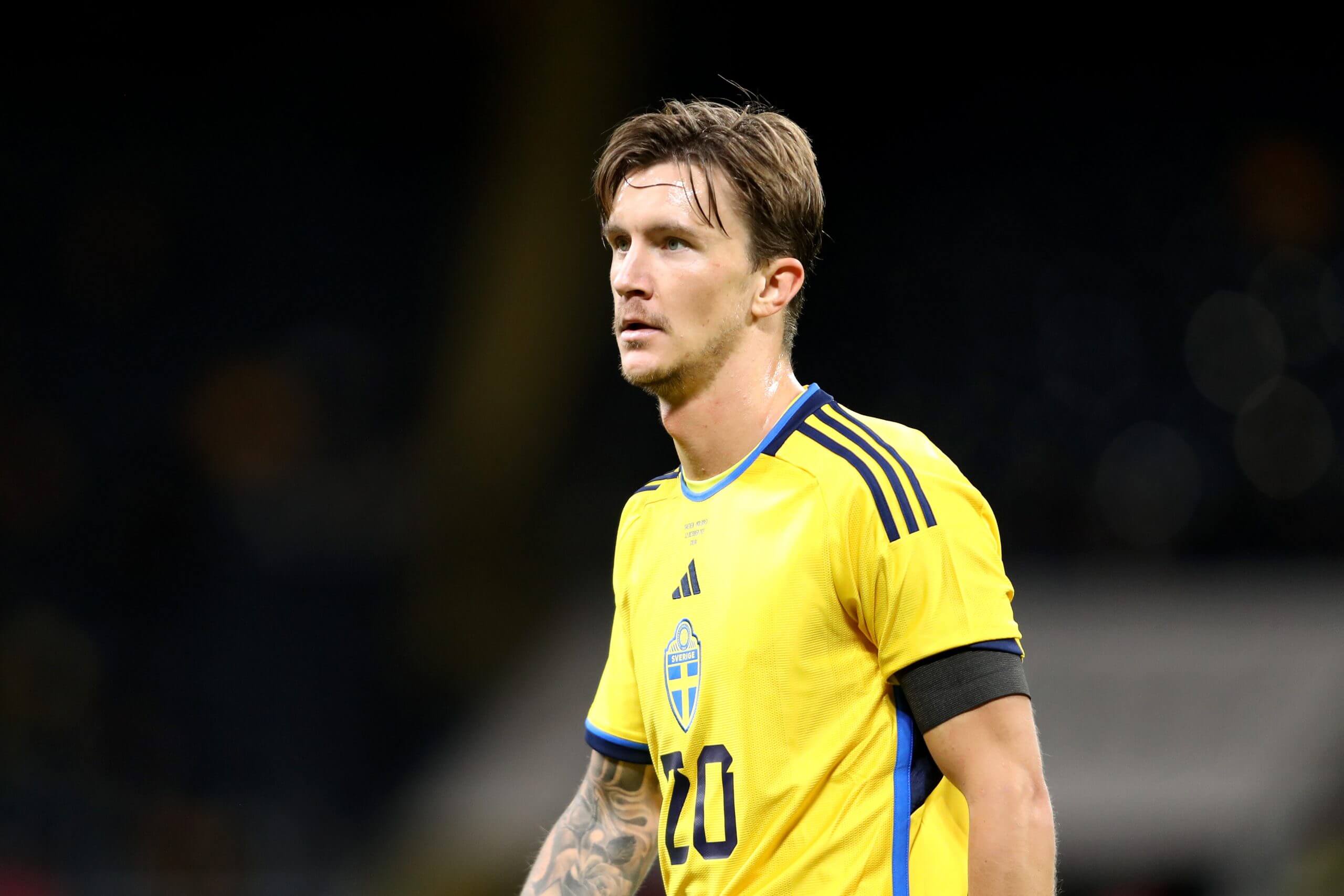
Olsson has 47 caps for Sweden (Linnea Rheborg/Getty Images)
“They told my parents to keep a diary so they could write things for themselves, but then so I could read it. I can look back at it. It was a big thing for them when I moved my finger for the first time. It is crazy. They haven’t properly told me (how scared they were) maybe to protect my feelings but I have understood that.”
Advertisement
Olsson had to comprehend the initial shock of waking to discover that instead of training for a title run-in, he was having to rebuild his body.
“I was not there mentally. When I woke up, I told them, ‘Of course I can walk’,” he says.
“In the beginning, every night I was thinking, ‘This is just a nightmare, I hope I wake up from this’. I went to bed but the next day (I realised) it was not a nightmare. Then the same thing the next day.”
He had trouble understanding the passage of time and comprehending what he had been through for the first two months. Doctors told him it could take patients years to recover, but his fitness levels gave him a better chance of healing quicker.
In a way, amnesia has shielded him from some of the distress as he is oblivious to how grave his situation appeared in the weeks he was supported by a ventilator.
That was how his sister placated his loss of memory but it was also the moment it dawned on him how painful it must have been for his loved ones to see him comatose, particularly his son, who was kept from the hospital until Olsson was in a better condition.
“When I saw him (his son) the first time after everything, it was probably one of the best hugs I have ever had. I was not 100 per cent in my head and body, so I couldn’t hold him as I didn’t want to drop him. I did some video calls with him and he was saying, ‘Dad, are you good now in your stomach?’.
“Maybe when he is 13 or 14, he will find out what happened and then I will talk and tell him everything about it.”
Olsson returned home in August and gradually returned to training, splitting three days at a rehab facility and two days at Midtjylland for the rest of 2024.
His illness was a shock to his team-mates but the club’s director of football, Peter Sand, says they used Olsson’s fighting spirit as a source of motivation in the final few months of the season.
Minutes before a game away to Copenhagen in May, manager Thomas Thomasberg showed the players a video from Olsson. It fuelled a seismic 2-1 victory and was so moving that it is still talked about as one of the defining moments of the season.
Advertisement
The crowning moment came on May 26 when Olsson arrived in a golf buggy, waving his scarf around his head after a dramatic final day of the season saw them pip Brondby to the title by a single point. He was able to deliver the silverware and hoist it aloft alongside former Brentford defender Henrik Dalsgaard.
“It’s such an inspiring story how Kristoffer has fought his way back,” says Sand.
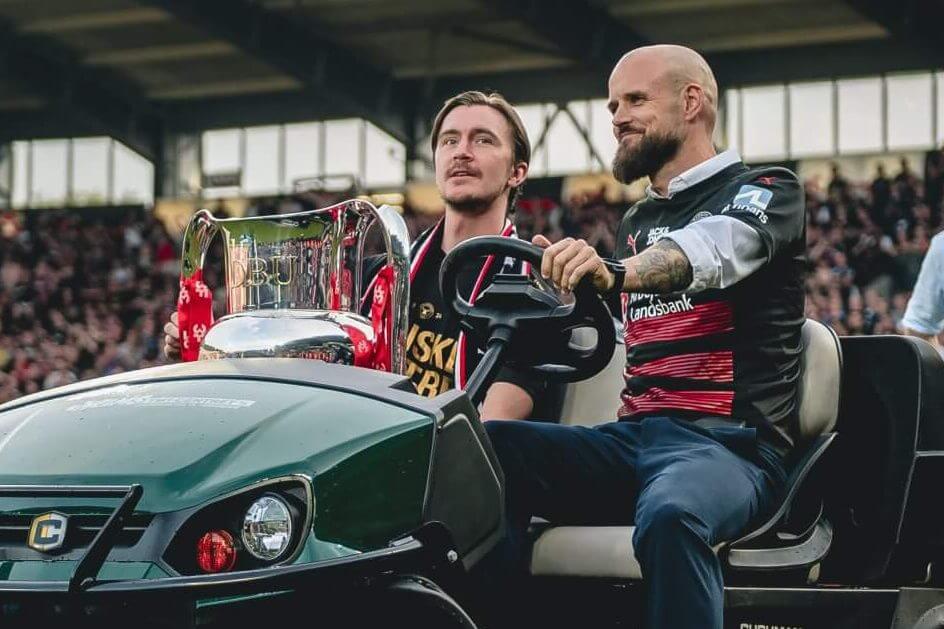
Olsson carries Midtjylland’s Superliga trophy in May 2024 (Daniel Stentz)
Doctors have given him the all-clear to continue playing after reviewing recent brain scans, though he did have one scare at the start of the year.
“I came home and felt tired after one of our (fitness) tests,” Olsson says.
“I went to bed but then I needed to vomit and (the memory of that day) came back. That is the one and only time.
“I called straight away and Kristian Nielsen (Midtjylland vice director of football) came and picked me up. We (visited the specialists) and they could see there was no problem. When they said that, I felt free in my head the next morning. I have learned now that if I don’t feel 100 per cent in my head or body, I’m not going to train.”
Cognitively, Olsson feels he is back to normal but regaining his sharpness is an ongoing process.
“Physically, I had some problems. When I first trained, if I was running and someone pushed me a little, I fell down, so I worked a lot on my balance and core.”
Doctors told him the condition tends to affect the extremities of one’s body but Olsson considers himself fortunate.
“My little finger on my right hand,” he says, laughing about how it manifests. “Better that it is in my fingers than toes because imagine the kicks in football. And it was also lucky it was my right hand as I’m left-handed.”
Olsson rejoined the squad in January and hoped for a return to competitive action on the anniversary of his illness, but that date passed.
He was informed before the latest international break that he would not be part of the Sweden squad.
“I feel better each week and am taking it step by step but then I’m not allowed to train with the team,” he says. “So I need to find somewhere to train as being in the gym and training myself all the time is not football.”
Advertisement
Olsson was not planning on leaving Midtjylland. His girlfriend, Alice, whom he met in 2023 before his illness but has come into his life fully since October, had just moved to Herning to be with him last month. But he and Midtjylland came to an agreement that allows him to realise his ambition of a comeback near his family.
With 47 caps for Sweden, the queue of interested clubs from his homeland was lengthy. However, his last competitive game came in December 2023 and there were obvious concerns about his health and his conditioning.
FC Midtjylland og Kristoffer Olsson har i gensidig forståelse ophævet kontrakten, så han kan vende hjem til Norrköping og tage næste skridt i sin rejse tilbage mod livet som fodboldspiller.
🇩🇰 https://t.co/hKsHwRPitX
🇬🇧 https://t.co/cXKybWrQkT pic.twitter.com/wVTsdtKVc0
— FC Midtjylland (@fcmidtjylland) March 29, 2025
“When people say, ‘Can he play football again?’, maybe, but maybe not at the same level. ‘Can he run again?’. Maybe, but maybe not as fast as before’,” says Olsson.
“My strength tests three weeks ago are better than they were before I got sick and the running is also kind of similar.
“The football, I’ve got it. Now it is important I get in my head that my brain is going to work faster. That is why I am going to train with Norrkoping. I need to get that feeling of someone running to press me. I’m not going to put pressure on myself but just give me a few weeks because the touch, technically, I have.”
Olsson will start training with Norrkoping without a salary in the hope of earning a contract in the summer but patience has never been Olsson’s strongest virtue.
He first joined Midtylland on loan in 2014 and his form earned him a senior international call-up in January 2015. However, he fractured his fibula in his first training for Sweden and was out for three months — but he took the cast off his leg quicker than advised. It did not stop him from going on to win the league title and the European Under-21 Championship with Sweden later that year.
Advertisement
Olsson had moved to Arsenal in 2011 as a promising youngster and before spells in Sweden with AIK, Russia with Krasnodar and Belgium with Anderlecht. He became a fixture of Sweden’s midfield from 2019 and played every game in their run to the last 16 of Euro 2020. He returned to Midtjylland in 2022.
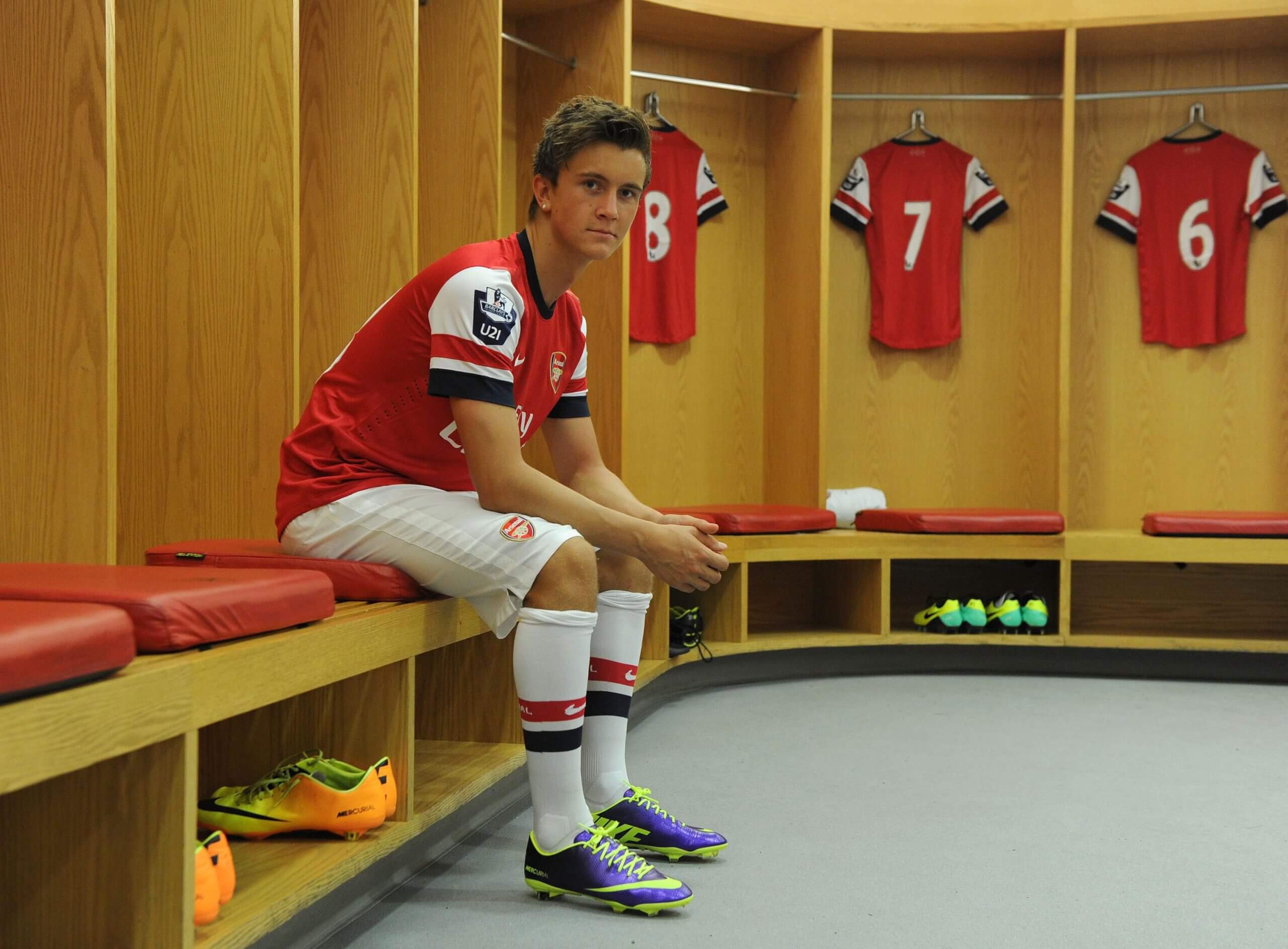
Olsson pictured in 2013, two years after joining Arsenal (David Price/Arsenal FC via Getty Images)
“I was so lucky that when I got sick, I was here at a club who knows me and with so many good hospitals around us. It was good timing, if it can be good timing.
“Midtjylland means a lot to me and as you can see from the pictures and the supporters, they have this song that ‘everyone loves Kris’ in Midtjylland and I can feel that. When I got sick, they were singing, ‘Our Swedish superman’. So, yeah, I am a superman.”
The sentiment was made clear at half-time on Saturday during Midtjylland’s game against Brondby. Olsson was given a rousing reception as he soaked up a lap of honour
“I wanted to enjoy everything. It was hard because the speaker started talking about one year on. I was taking deep breaths but then I looked around the stadium and even the Brondby fans were standing and applauding.
“It is hard for me to talk about as it is a feeling I have never had before. I have never had a proper goodbye to any club because in football, you pack your bags one day and then you are gone tomorrow. It is an emotional feeling but also a really good feeling because when something ends, something new starts.”
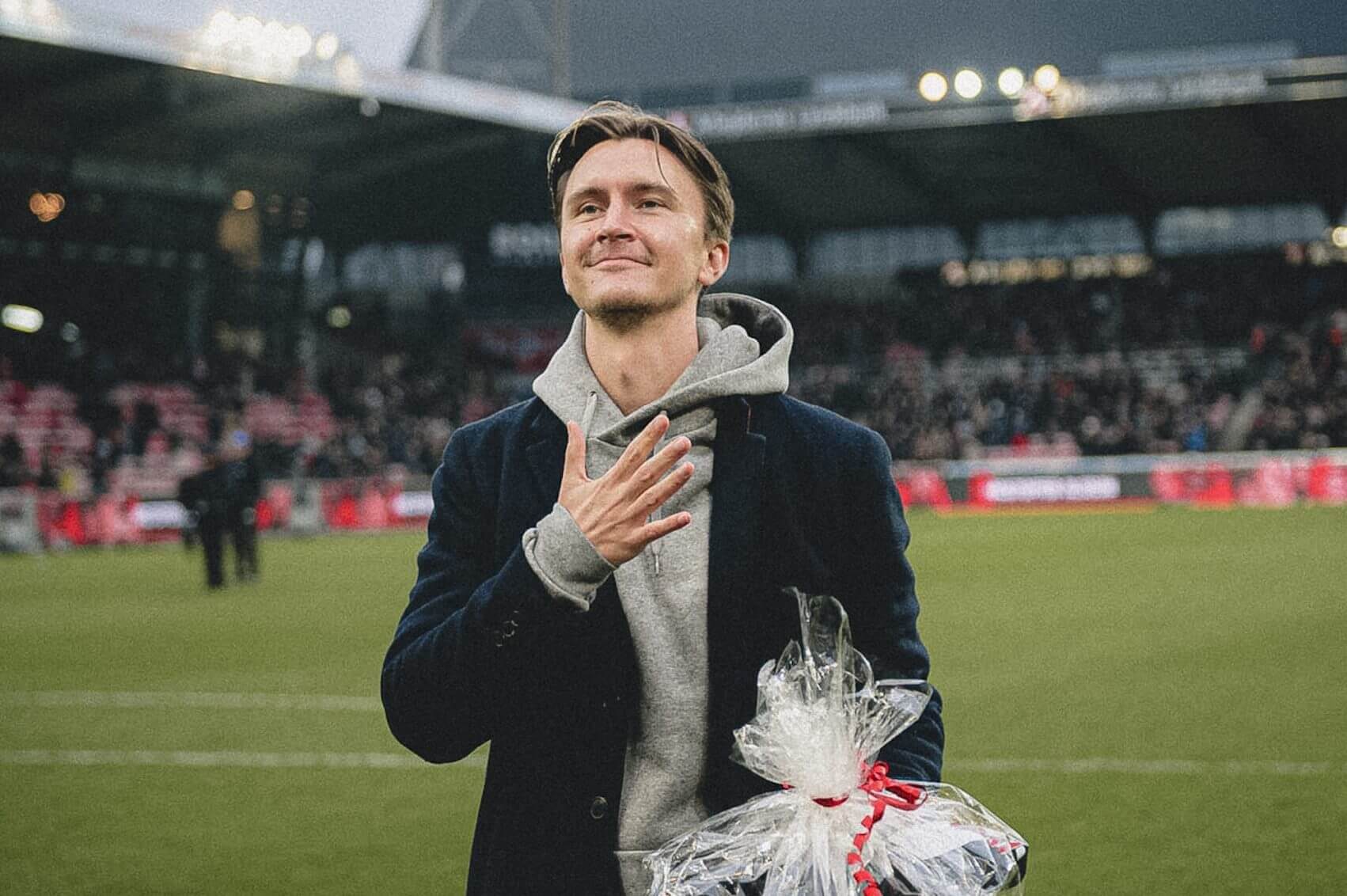
Olsson shows his appreciation for the fans (Daniel Stentz)
Olsson flew home on Tuesday to start a new chapter of his life, living in the same city as his son, girlfriend and parents, who he has been away from since he left for London as a boy.
“Football has been everything for me but now it’s like how it should be,” he says. “It’s about life. I have got my life back and now life is better than it was before. I love Jamie so much and it is going to be fantastic to be close to him.
“I am looking forward to that first game. Not only the first pass or shot, it is the thing when you are in the changing room with your team-mates ready to get going. I miss that feeling before you go in the tunnel. I miss it so much.
Advertisement
“My dream is to be a better player than before I got sick. I will be a better version of myself mentally as well as a footballer.”
Other players may have taken such a health scare as a sign to call time on their careers. Olsson, who turns 30 at the end of June, sees it differently.
“(The) type of player (I am) gets better because you become cleverer with experience. I can at least play 10 years more.”
Rather than representing the end, could this illness mark the halfway point of his career and see him return in ‘superman’ form?
“Exactly,” smiles Olsson.
(Top photo: Daniel Stentz)


